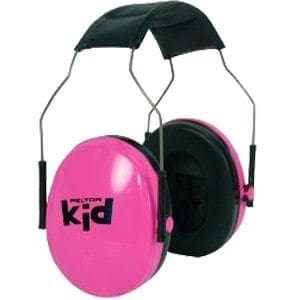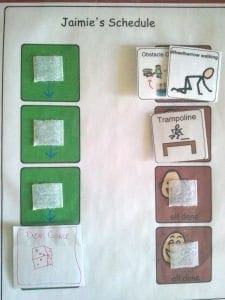Cool Sensory Tools For School
Caregivers who have “sensational” kids struggle with many things. One of the most difficult areas they struggle with is ensuring all the support, tools and strategies are in place to help get their child through the school year. We have been so fortunate in Jaimie and Xander’s cases because, despite a rocky start, each of their schools and teachers have been right on board not only with learning about SPD, but also how it affects each of our kids and what exactly each of them needs to thrive.
 [1]In terms of my kids in school, what I’ve found that has worked for them is a strong combination of three things: (a) Understanding what works for each child here at home and then trying to see how those strategies can be worked into the school environment; (b) teachers willing to understand what works at home then being willing to incorporate those things into the classroom routine; and (c) including the expert perspective of our OT. The final point is an important one for those caregivers trying to get their child’s school on board. Oftentimes, simply having that expert point of view on your side can be all it takes to have school administrators and teachers say, “Oh, okay. This is a serious thing we should pay more attention to.”
[1]In terms of my kids in school, what I’ve found that has worked for them is a strong combination of three things: (a) Understanding what works for each child here at home and then trying to see how those strategies can be worked into the school environment; (b) teachers willing to understand what works at home then being willing to incorporate those things into the classroom routine; and (c) including the expert perspective of our OT. The final point is an important one for those caregivers trying to get their child’s school on board. Oftentimes, simply having that expert point of view on your side can be all it takes to have school administrators and teachers say, “Oh, okay. This is a serious thing we should pay more attention to.”
The first school tool I found most helpful was a document called a School Accommodation Sheet. This is similar to a big checklist that your OT prepares outlining exactly what your child needs in terms of sensory input. Usually the therapist will also offer specific exercises or tool suggestions and ways teachers can incorporate the suggestions into their regular routine in the least disruptive way. I found this an ingenious tool because it backed up all the things I tried talking to the school and teachers about, but this gave a much more detailed outline. Jaimie’s teacher kept a copy of it pinned on the wall beside her desk to refer to. Her Grade Two teacher (who has a child with SPD of her own) got all the kids participating in the sensory exercises so Jaimie wasn’t isolated. Brilliant!
With your School Accommodations sheet coupled with your knowledge of what works at home, you’re well on your way to setting your ‘sensational’ kid up for academic success! All you need after that is to gather together the tools and fidgets he responds to the best. These are what we call, ‘Jaimie and Xander’s Cool School Tools’, which they—and all of their classmates—consider just another school supply each of them needs.
Just like with what works at home, you want things that calm her, help her focus her attention where it should be, enable her to tune out unnecessary distractions, assist her to sit still, help her hold her writing utensil properly, and help her to do a task with many steps as best as she can. It’s a great idea to have a variety of tools you switch between to match needs and self-regulation abilities as well as what’s going on with your child throughout the day. For example, Jaimie has greater self-regulation skills than Xander does but her anxiety is much higher, and lasts a lot longer than Xander’s.
Both Jaimie and Xander need regular vestibular and proprioception input throughout each of their day (every 60 to 90 minutes). They both get three recesses a day plus gym time, but sometimes they don’t always get the specific input they each need even with all of that. And as you all know, when their bodies aren’t regulated, it can be difficult to concentrate on homework, sit still or have patience with all the little things that pop up during the day.
So here’s what I make sure each of my kiddos has with them for school.
For Jaimie (who is easily overwhelmed but with higher self-regulation skills):
- Noise reduction headphones: These help her tune out distracting noises, keep her focused on her task at hand,
 [2]prevent her from going into auditory overload during line-up or assembly as well as giving her a way to calm back down after recess. Headphones have also given Jaimie confidence in trying different social events (like the assemblies) that terrified her before because she isn’t overwhelmed by noises, echoes, music or the ‘hum’ of a lot of voices blended together.
[2]prevent her from going into auditory overload during line-up or assembly as well as giving her a way to calm back down after recess. Headphones have also given Jaimie confidence in trying different social events (like the assemblies) that terrified her before because she isn’t overwhelmed by noises, echoes, music or the ‘hum’ of a lot of voices blended together. - School Fidget box: Although we keep this at home, we keep it by the front door under her coat hook so she can pick and choose the fidgets she wants for the day ahead based on how she feels that morning. We have various fidget boxes, but this one contains chewy items (an actual chewy, straws, gum, pencil top chewies); little guys that light up, bulge out, stretch or squish; a mini-Rubics cube, scented stickers and stretchies, etc. Just think, anything that has texture and/or offers other sensory input and can keep hands busy to ease stress, anxiety or help focus attention is perfect.
- A round textured inflatable seat cushion: Not only does this help with keeping Jaimie still, but it also gives her a little leeway to move slightly if she needs to without distracting
 [3]those around her. Plus, the texture gives her some pressure while she’s sitting.
[3]those around her. Plus, the texture gives her some pressure while she’s sitting. - Lap cozy: You can either purchase these or make them yourself from material stuffed with packaged beans (just be sure to have your OT advise you to the proper weight for your child because too much can hurt them while too little can actually trigger symptoms.) We have different ones with varying weights, depending on how much she needs at a given time (and most times, she needs a lot of weight). She loves her lap cozy. It gives her both weight as well as something to rub if she feels anxious.
- Lamby: Not all schools/teachers will be okay with this one. Lamby is a weighted stuffy that has both texture as well as a scent. It can also be warmed up for the temperature tactile input as well. Lamby caused some issues at first. The rest of Jaimie’s school friends started bringing stuffies to school too until the teacher had a discussion with the class about Lamby being a sensory tool, not a toy she plays with. It is something Jaimie needs to function at school. What I loved (and I hugged the teacher for this) was how she said, “Jaimie needs certain things to help her feel better. Sort of like if she had diabetes, she would need needles to feel better. Jaimie’s Lamb is a special tool that helps her be able to work and play with us.” I thought this was incredibly insightful considering I never even used that analogy with this teacher. I did with the principal but not the teachers!
- Weighted gloves: I was so excited to find these at Flaghouse.com. I originally got them to give Jaimie a bit of weight while doing fine motor tasks but they also help remind her how much pressure she needs to use with her hands as well as helped her learn how to hold her pencil properly!
For Xander (who’s difficult to calm down once he gets going):
- Noise reduction headphones: Opposite of Jaimie who melts down with too much noise, Xander actually gets revved up. So the headphones help him concentrate, stay calm, block out unnecessary distractions and keep him focused.
- Textured wedge: This is the same idea as Jaimie’s cushion except the wedge is slanted to help Xander sit straight. Xander leans when he gets tired and the wedge helps give him pressure as well as keeps his posture straight.
- Foot rest: Also helps Xander with his posture as well as stops him from resting his feet on everything (or everyone!)
- Fidgets: Xander doesn’t seem to need as wide a variety as Jaimie does but he has cars that he likes to hold and rub or spin the wheels and a stress ball.
- Lap cozy: Weight works well for Xander too to keep him still, calm and focused.
- Blankie: This is actually one of my old hooded sweatshirts. Xander likes putting it on to get that ‘cocoon’ feeling many of our ‘sensational’ kids love when the world is too overwhelming or feels too big.
- To Do’ list: Xander has a lot more difficulty with staying on a task and needs things set up for him in a specific way to keep track of what he’s doing. We learned this from his and Jaimie’s
 [4]OT. It’s basically a laminated piece of paper with two columns, each having a line of Velcro running down them. There are little Velcro picture cards that can outline steps in a task or represent a specific event that are put on the left side and as each step/task is completed, the card gets moved over to the right (‘Done’). This continues until all steps of the task/day’s events are ‘All Done’. This not only helps keep a child on task but also gives the sense of completion, which is so important to them (Jaimie uses one too but doesn’t rely on it as much anymore).
[4]OT. It’s basically a laminated piece of paper with two columns, each having a line of Velcro running down them. There are little Velcro picture cards that can outline steps in a task or represent a specific event that are put on the left side and as each step/task is completed, the card gets moved over to the right (‘Done’). This continues until all steps of the task/day’s events are ‘All Done’. This not only helps keep a child on task but also gives the sense of completion, which is so important to them (Jaimie uses one too but doesn’t rely on it as much anymore).
We’ve been so fortunate with Jaimie and Xander’s school in that they have always been willing to learn about SPD and Jaimie and Xander’s specific form of it. I know that this doesn’t happen for many families out there and for you I say, keep at it. Bring your OT’s reports with you or, better still, see if she’ll come with you. Remember, education is the first step in raising awareness, so don’t give up!![]() [5]
[5]
CHYNNA LAIRD – is a psychology major, freelance writer and multi award-winning author living in Edmonton, Alberta with her partner, Steve, and their three daughters [Jaimie (eight), Jordhan (six), and baby Sophie (three)] and baby boy, Xander (four). Her passion is helping children and families living with Sensory Processing Disorder and other special needs.
You May Also Like
- DIY Sensory Rooms on a Budget! [6]
- Sensory Processing Disorder (SPD) Know the Signs, Characteristics & How to Help [7]
- Pittsburgh Int’l Airport Unveils the Largest, Most Comprehensive Airport Sensory Space in the World [8]
- Ever Wonder What It’s Like to Experience Sensory Overload? [9]
- Enriching Your Child’s Sensory Environment Within Their Typical Routine [10]
- Travel Tips for Parents of Children with Sensory Integration Issues [11]
- Picnic in the Garden: Sensory Play and Sensory Foods for the Outdoors [12]
- 7 Sensory Games Dads Can Play With Their Children [13]
- 5 Ways to Help Children with Sensory Challenges Participate in Halloween Festivities [14]
This post originally appeared on our September/October 2011 Magazine [15]
